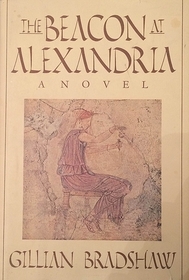This is the story of a young girl named Charis, who comes from a good home in Ephesus. The year is 371 and it's the last days of the Roman dominion over the eastern Mediterranean. Charis is going to be forced into marriage with a brute of a man who happens to have a great deal of power. In order to escape this fate, she runs away to Alexandria to pursue her one passion: medicine. Disguised as a eunuch (women were not allowed to study the mysteries of Galen and Hippocrates) Charis finds a mentor and protector in Philon, a wise, kind-hearted Jewish physician.
Gillian Bradshaw knows ancient Rome. She brings the past to life in this novel of the waning days of a fascinating civilization, and the dawning days of Christianity. I found the various denominations (if you will) of Christianity to be very interesting. This was a time when Christian theology was still being hammered out, and pagan religions were still observed. I also enjoyed the medical theories that were in use at this time; what they believed, what they could do, and what they were helpless to prevent, treat or understand. The author has a scholarly background in Classical studies, and it shows in her writing. If you enjoy immersing yourself in a past culture, you will enjoy "The Beacon at Alexandria."
Gillian Bradshaw knows ancient Rome. She brings the past to life in this novel of the waning days of a fascinating civilization, and the dawning days of Christianity. I found the various denominations (if you will) of Christianity to be very interesting. This was a time when Christian theology was still being hammered out, and pagan religions were still observed. I also enjoyed the medical theories that were in use at this time; what they believed, what they could do, and what they were helpless to prevent, treat or understand. The author has a scholarly background in Classical studies, and it shows in her writing. If you enjoy immersing yourself in a past culture, you will enjoy "The Beacon at Alexandria."




